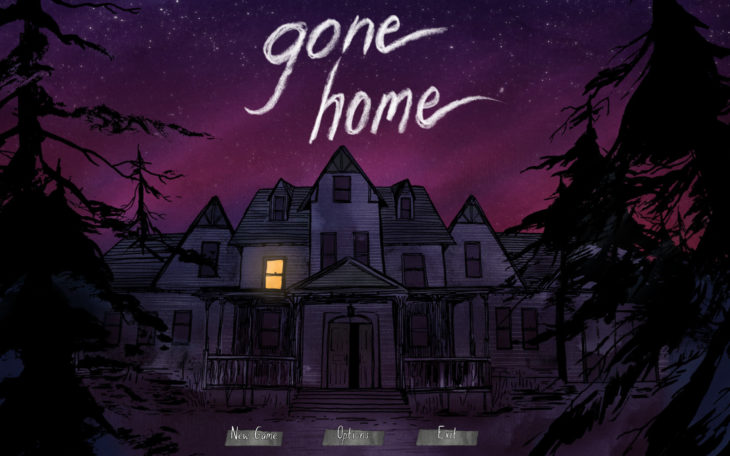
Gone Home Is the Most Important Game You’ve Never Played
The Fullbright Company’s Gone Home debuted in 2013, and while it didn’t create the walking simulator genre, it has come to define it. As noted by IGN, the walking simulators trace their origins back to the 8-bit 2-D landscape of the 1980s.
After Dear Esther’s release in 2012, the name and genre were resurrected, and a wave of walking simulators followed. Games like The Stanley Parable, Everybody’s Gone to the Rapture, Firewatch, Virginia, and What Remains of Edith Finch poured out of indie gaming studios faster than the mainstream gamers could play them. A few years later, this wave of walking simulators culminated in the ultimate high-concept and literal walking simulator, Death Stranding.
Gone “Home”
Although Dear Esther and Gone Home both sold around 750,000 copies each, Gone Home landed perfectly in the center of a cultural soft spot that had been looking to be hit for quite some time.
I started Gone Home completely blind. I had heard nary a word about the game’s plot, much less the massive cultural impact it has had. I fired it up, and immediately, a voicemail played over a black screen, setting the stage for this reverse Odyssean quest.
Our hero, Katie Greenbriar, is coming “home” from Europe, where she has been serving in the military. Her family has moved into a new home since she left. So, the house she returns to might be home to her family, but for her, it’s foreign, strange, and even a little scary.
Katie arrives at night during a thunderstorm (of course) to find a note written by her younger sister Samantha, the main POV vehicle for the narrative, attached to the home’s front door. The note is devoid of details, but it clearly shows something has gone wrong. After finding the front door key, her grand homecoming is met with darkness and an eerie silence.
Although the beginning certainly sets the player up for a classic horror game, Gone Home really isn’t that, at least not in a traditional sense. The game plays with the often troubling ideas of what “home” really means. It pokes and prods at the players’ nerves, almost feigning traditional horror to understand the horror in an individual’s experience of growing up and being seen as “different.”
There are no big jump scares or cheap thrills here, yet there is a genuine sense of unease. All the player knows is that Katie’s sister is missing, and her parents are nowhere to be found. It sounds an awful lot like horror, which maybe it ultimately is, but not in any supernatural or grisly sense. Katie and Samantha’s world is more grounded, and sadly, more realistic than a house full of haints and boogers.
Gone Home is a family drama. It concisely and sincerely unravels the life of a queer teenager and a family and community that doesn’t understand her. It’s a personal kind of horror that has seemed to resonate with a lot of players.

Why Is Gone Home Such a Big Deal?
As a straight male player, much of the interpersonal struggles of being a queer teenage girl weren’t lost on me, per se. However, I clearly could only do my best to empathize with certain struggles I would never fully sympathize with for sheer lack of experience. But for many players in the LGBTQ+ communities, this game represents something very close to their own lives. Gone Home is special for telling a story that hadn’t been told on this platform and certainly not in this kind of way.
The gaming world was/is shifting. The stories being told are becoming more inclusive, more thoughtful, and more creative. As the technological barriers for entry continue to diminish, the medium is opening up exponentially.
While the game has tremendous value and widened the field for different stories to be told in the gaming world, it still was incomplete. All characters were white and clearly wealthy enough to live in such a labyrinth of a home. This isn’t to say that Gone Home is problematic or any other internet buzzwords – obviously, one game can’t cover everything – but it does mean that the world of games is still far too small and closed off.
It’s easy to look past old games like Gone Home nowadays because there are 50 million more just like it that are better, more diverse, more artistic, and so on. However, those games may not have had the platform or proof of concept to be greenlit if it weren’t for this trailblazer.
Gone Home may not be the best game you’ve ever played, but it might be one of the most important. The entire game is concise and well-paced. It does a great job of bringing the player into this mysterious and fractured world.
Gone Home highlights a queer character in a way that, from the outside, feels empathetic and caring. The work excels in its focus on something that is clearly very tender and even potentially frightening. While its representative value brought it from the obscure to the mainstream, its broader themes of losing the sense of home and navigating ever-changing family dynamics keep it a timeless title.






